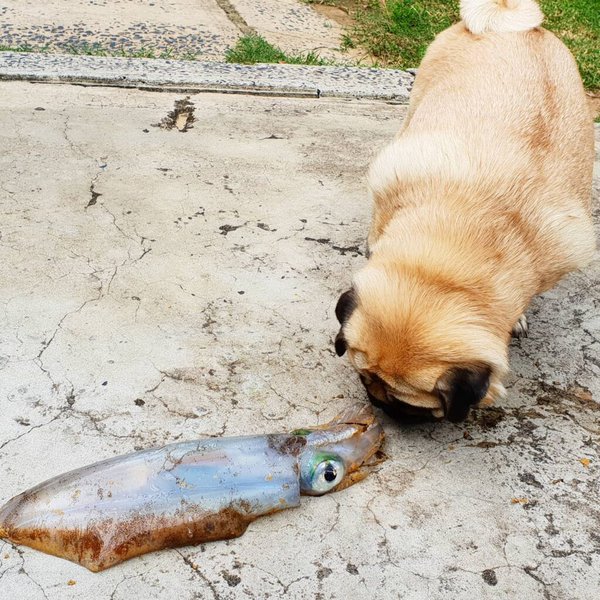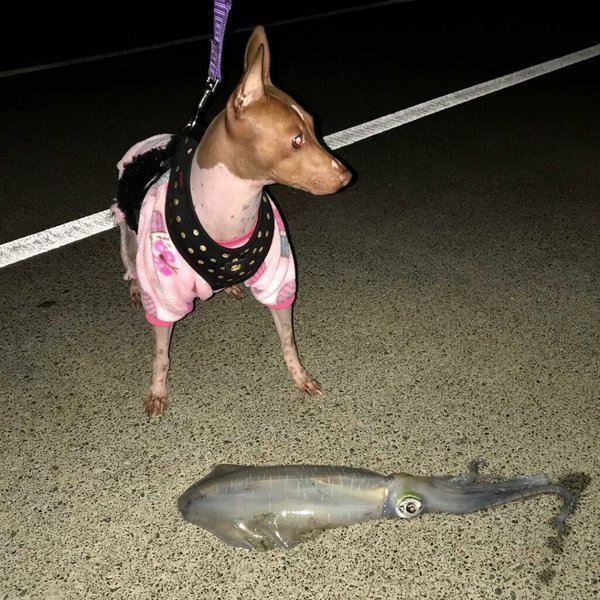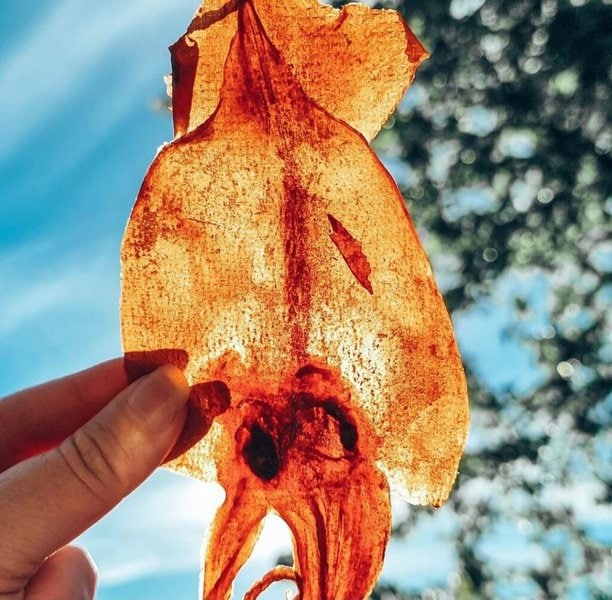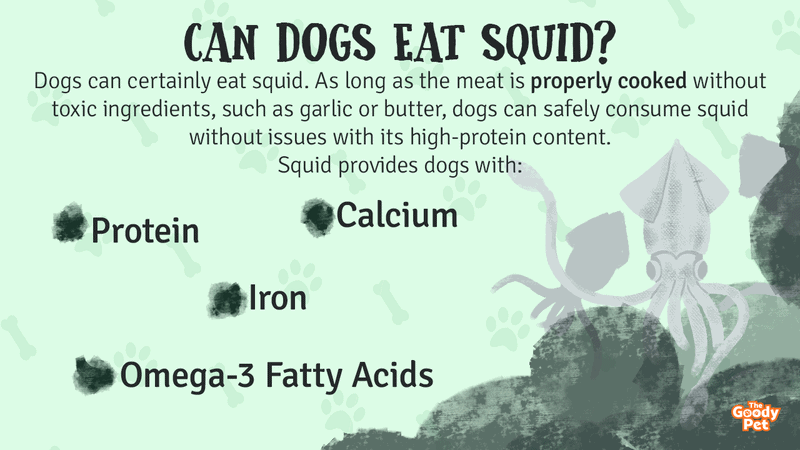Because dogs tend to learn several behaviors from their interaction with humans, certain acts from our furry friends should not surprise us anymore. Therefore, if you’re a fan of squid, you may love to know if your doggie can enjoy its sweet taste without getting sick.
Dogs can certainly eat squid. As long as the meat is properly cooked without toxic ingredients, such as garlic or butter, dogs can safely consume squid without issues with its high-protein content. On the other hand, consuming raw squid regularly can cause dogs to experience diarrhea or succumb to dichlorodiphenyltrichloroethane poisoning.
While squid can be really tasty, there are certain precautions to consider before giving it to your dog. On the other hand, it also provides many nutritional benefits for it. Join me as I talk about these and more below.
Can Dogs Eat Squid?

Dogs can eat squid because they’re carnivores, and squid is naturally not toxic. Squid doesn’t naturally contain toxic chemicals like verrucotoxin and tetrodotoxin that some marine species like stonefish and pufferfish tend to have.
Squid is also a great source of protein for dogs, so it’s beneficial to your pooch. Nonetheless, for your pooch to enjoy squid without any problems, it would be best to give it a properly cooked dish.
Can My Dog Be Allergic To Squid?
Your dog can be allergic to squid. Some dogs are allergic to seafood like squid, and your dog could be one of them.
If your dog is allergic to squid, it will exhibit symptoms such as vomiting, diarrhea, tremors, itchy skin, and even hives.
First, it would be best to test whether your dog is allergic to squid by providing small amounts for tasting to avoid the full effects of your dog reacting to seafood allergens like squid. If no allergic reactions are found, then you can give your dog some squid to eat.
However, if your dog suffers from allergies after eating squid, it’s best to take your furry friend to the nearest vet clinic.
What Nutritional Benefits Will My Dog Obtain From Eating Squid?

Squid provides a couple of useful nutrients for your dog when eaten; some of these nutrients include protein, calcium, omega-3 fatty acids, and iron.
Protein
Protein is key to your furry friend’s development. When broken down, protein provides amino acids necessary for bodybuilding and repairing and replacing worn-out cells and tissues. It also helps to prevent nutritional deficiencies caused by the consumption of excessive carbs.
Furthermore, 4 ounces of squid contains about 18 grams of this vital nutrient. So, given protein’s usefulness in your pooch, squid is considered to be a great meal.
Calcium
Calcium is a mineral nutrient that helps develop strong bones and teeth in canines. A hundred grams of properly cooked squid can contain up to 32 milligrams of calcium. Thus, it’s a great source of this nutrient.
Apart from aiding the development of skeletal tissue, calcium also helps maintain proper nerve function and a steady heart rate. Furthermore, dogs with sufficient amounts of calcium have lower chances of developing osteoarthritis than those who eat low-calcium diets.
Omega-3 Fatty Acids
Squid is also a rich source of omega-3 fatty acids. This nutrient helps in keeping cell receptors functioning in dogs. This function is essential for activities that occur at the cellular level, such as cell division and osmosis.
Furthermore, omega-3 fatty acids help in blood clotting and proper hormone function.
Iron
Squid contains a lot of iron. And this mineral nutrient is key in keeping your pooch’s blood healthy. Iron provides hemoglobin which gives your furry buddy’s blood that rich red color and helps in the blood oxygenation process.
Iron also prevents your dog from having anemia. In addition, some enzymes, such as catalase, benefit from the iron that squid provides to dogs.
Can Dogs Eat Fried Squid?
Dogs should not eat fried squid because of its high fat and salt content. Fried squid, or calamari, is an absolute delicacy. But that doesn’t mean it’s good for your pooch.
Why Is Fried Squid Bad For My Dog?
What makes eating fried squid dangerous for your furry friend are the potential issues that arise from the condiments used in making the dish.
Read on to find out more about the reasons why it is bad.
Excessive Salt Content
Most times, calamari is deep-fried. And the batter the squid is dipped in before frying often contains a lot of salt.
Salt, in excessive quantities, is harmful to dogs. Seafood, such as squid, is typically high in saline. So when extra salt is added, especially before frying, it becomes too much for your pooch.
Consuming excessive salt tends to make your pooch very thirsty. In this situation, if your furry friend doesn’t get enough water quickly, it will be dehydrated. Dehydration is particularly dangerous in dogs because they require lots of water for normal metabolism.
An imbalance in fluid content in the body could lead to an equally or even more drastic change in the metabolism rate of your pooch. And most times, this change has adverse effects on your furry friend. It will experience dizziness, weakness, and fatigue during this period.
Furthermore, excessive salt can damage your dog’s kidneys. Studies show that excessive salt intake in dogs tends to cause severe kidney issues. With fried squid being very salty, there’s a high possibility of your pooch developing kidney stones after eating the dish extensively.

Excessive Fat Content
Furthermore, eating fried squid could predispose your furry friend to heart issues due to cooking oil’s high-fat content. Fried squid, calamari, can have incredibly high amounts of fat depending on the kind of oil used in frying it. If the oil is rich in saturated fats, it then poses a problem for your dog’s health.
One bite-sized piece of calamari isn’t an issue regarding fat intake, but dogs can eat up to 50 grams of calamari at once. And because calamari is fat-filled, that fat will enter its bloodstream and clog important blood vessels.
When blood flow is restricted, blood pressure can rise rapidly and cause serious issues ranging from cardiovascular arrest to fever, migraine, and even stroke.
So, with all these effects that could arise from your dog consuming fried squid, it’s best to avoid giving your pooch calamari.
Low Nutritional Value
Furthermore, fried squid has very little nutritional value. For instance, it takes an extra forty-three grams of calamari to provide the same amount of protein as a hundred grams of cooked squid. Thus, with the potential problems calamari could cause for your furry companion, it’s not a good idea to give your dog fried squid for nutrition.
Can Dogs Eat Raw Squid?
Dogs shouldn’t eat raw squid because it often has harmful bacteria and, in some cases, toxic chemicals that could harm your pooch.
Because of sea pollution, there are high chances of squid containing certain toxic materials when freshly caught from the sea.
What Will Happen To My Dog If It Eats Raw Squid?
Your dog could suffer from mercury and DDT poisoning if it eats raw squid. Furthermore, if you give it uncooked squid, your furry friend could be the victim of a terrible bacteria infestation.
Please stay with me as I explain these effects below.
Mercury Poisoning
If your dog consumes squid containing mercury, it’s likely to suffer from mercury poisoning. And the dangerous effects of this condition include swelling, vomiting, extreme pain, diarrhea, and even bleeding. In extreme cases, mercury poisoning can be swiftly lethal in dogs.
DDT Poisoning
Raw squid can also contain DDTs compounded over time in the seafloor or low current areas. DDT, or dichlorodiphenyltrichloroethane, is a common pesticide that’s slowly becoming vague due to its high toxicity.
Nonetheless, factories still producing this chemical tend to release toxic sludge from the production process into the ocean. And because it’s non-biodegradable, DDT can stay in the water for a long time.
Sadly, marine animals like squids consume this toxic waste. Thus, if your dog happens to eat a freshly caught squid that hasn’t been cooked, there’s a high possibility of it taking in DDT too.
DDT can have devastating effects on your dog once it reaches toxic amounts. It impairs functionality in the kidney, liver, immune system, and nervous system, and eventually, it could lead to the death of your pooch.
Bacteria Infestation
Although your dog can eat raw squid, it’s not a good idea because of the potential harm it could cause your furry friend. And a bacteria infestation is one of the major reasons your dog could have these issues.
It’s not uncommon for seafood to have a lot of bacteria in them. This is because bacteria thrive on organic material, and the sea is home to myriad organisms and organic waste that bacteria can feed on.
As squids move in the water, they pick up these bacteria, which can stay in their bodies for a long time. These bacteria may not even harm the squids. In some cases, they may even form a commensal relationship with them. The bacteria may infest the sea animal to lethal extents in other rare cases.
Bacteria in seafood aren’t friendly to both humans and dogs. Most times, flesh-eating bacteria like Vibrio vulnificus infest the gut of humans that eat raw seafood. So, it’s a painful process.
Vibrio vulnificus can cause sepsis in dogs too. And most often, it’s irreversible and leads to death.

Diarrhea
Diarrhea is one issue that Salmonella, another kind of bacteria found in raw squid, causes. Diarrhea can be devastating for your furry friend if you cannot manage it and provide proper healthcare.
Because when your pooch suffers from it, it loses a lot of body fluids and becomes dehydrated. Thus metabolism rates will be altered. Without proper oral rehydration therapy, your furry friend would be in a lethal situation.
In addition, bacteria infestations have the potential of doing a lot more than just giving your dog diarrhea and eating its flesh. Fever and muscle tremors can also occur due to the negative effects of bacteria in your canine buddy. Eventually, if these continue, they can lead to death.
After seeing the adverse effects of giving your pooch raw squid, it’s best to provide only properly cooked squid for your dog. Nonetheless, if your dog has already consumed raw squid and is suffering from one or more of these effects, I advise you to take it to the nearest vet for treatment.
How Long Should I Cook Squid Meant for My Dog?
It would be best if you cooked raw squid for up to an hour before you can be sure that any harmful microorganism on it has died and it is safe for your dog to consume.
Typical harm-causing bacteria like Salmonella and Vibrio die off about 30 minutes after being boiled. But to thoroughly eradicate any bacteria that might lodge in areas where heat isn’t properly distributed, it’s recommended to cook the squid for at least an hour even after it becomes soft enough to eat.
Can I Spice Up Squid While Preparing It for My Pooch?
It’s very important to avoid using certain condiments such as butter, nutmeg, garlic, curry, and salt when cooking squid for your pooch, as they can be detrimental to your canine buddy’s health.
Nutmeg
Nutmeg is a common spice used in various kinds of dishes. Unfortunately, while its taste in squid can be delightful to you, it’s an absolute nightmare for your pooch.
Nutmeg is toxic to canines. Even minute levels of this spice in food meant for your dog can expose your dog to harm. Seizures, tremors, cardiac arrest, and hallucinations are some of the known effects of nutmeg on dogs. So, to avoid these issues, it’s best to steer clear of this spice.
Butter
Butter isn’t exactly toxic to dogs. Where the problem lies is in its excessive fat content. Fat content is not a bad thing when your dog eats it in very small, regulated quantities.
But butter contains a lot of unsaturated fats that can be absorbed into your canine’s bloodstream and impair blood flow. If fat that can’t be broken down settles in the veins and arteries of your canine, it will cause cardiovascular issues for it.

Garlic
Garlic can greatly improve your squid dish. But while it can make your dish more exciting, it poses a danger for your furry friend.
Garlic contains thiosulfate, a chemical that’s toxic to dogs. Even if eaten in small quantities, it can cause vomiting, diarrhea, and tremors in your pooch. So it’s best to avoid flavoring squid meant for your pooch with it.
Curry
While curry adds a lot of flavor to squid, it’s not ideal for your canine companion. Curry causes severe diarrhea in dogs. In addition, just a little bit of squid will cause your pooch to stool uncontrollably.
Thus, it’s best to avoid adding curry to squid meant for your pooch.
Salt
As mentioned, salt is bad for your pooch because it causes dehydration. Salt molecules tend to react with many water molecules in your pooch’s body, making it thirsty. If it doesn’t get oral rehydration therapy, dehydration will be inevitable.
Nonetheless, if you mistakenly include any of these spices in your dog’s squid, it’s best to contact your vet to provide the necessary healthcare for your animal.





